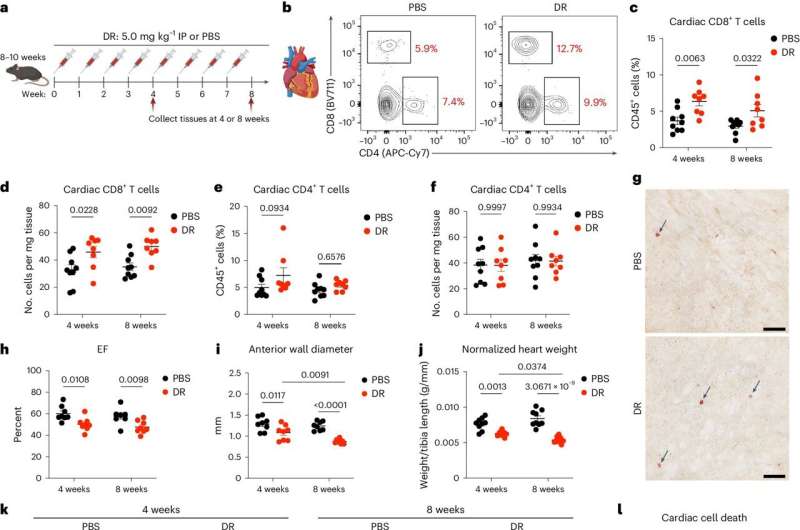This article has been reviewed according to Science X's editorial process and policies. Editors have highlighted the following attributes while ensuring the content's credibility:
fact-checked
peer-reviewed publication
trusted source
proofread
Why the most prescribed chemotherapy drug can cause serious heart damage

There's still much to learn about how doxorubicin, a 50-year-old chemotherapy drug, causes its most concerning side effects. While responsible for saving many lives, this treatment sometimes causes cardiac damage that stiffens the heart and puts a subset of patients at risk for future heart failure.
To better understand and potentially control such complications, Tufts University School of Medicine and Tufts Graduate School of Biomedical Sciences researchers have isolated the immune cells that become overactive when patients take doxorubicin. The team's findings appear July 17 in the journal Nature Cardiovascular Research.
Doxorubicin is a top choice for oncologists as a first line of defense against various cancers because of its ability to slow or stop cell division and thus tumor growth. It has been shown that the drug can induce a pro-inflammatory response in the heart, but there is no intervention that is broadly effective at preventing this, and it's not clear how it happens or why, so Tufts scientists are trying to close these gaps.
Their investigation found elevated levels of potent virus-killing CD8+ cytotoxic T-cells—a type of immune cell—and their molecular attractors in the blood of healthy mice after beginning doxorubicin. This observation was further confirmed in dozens of canine and human lymphoma patients. Further mouse model work showed that these T-cells not only moved to the heart and directly interacted with heart tissue but that removing them relieved cardiac inflammation and fibrosis—the scarring of the heart muscles due to injury.
"Our study is the first to show that a specific cell type can cause chronic inflammation in the heart after doxorubicin treatment and the first time T-cells have been implicated in this disease," says first author Abe Bayer, a student in the Tufts MD/Ph.D. immunology program. "This suggests that blocking T-cells from going into the heart might be a strategy to make a medication to prevent the cardiac damage associated with the drug."
Bayer and his colleagues figured out that something about doxorubicin is causing CD8+ T-cells to become dysfunctional by making them recognize something in the heart as foreign, leading them to become overactive. The reason the chemotherapy drug draws the T-cells from the blood to attack cardiac tissue has yet to be defined, but that will be the focus of future work.
The research team found that, once in the heart, the CD8+ T-cells can cause changes to the organ, leaving the cardiac tissue scarred, highly fibrotic, and less able to perform. Their research showed that in mice the T-cells are releasing molecules that are meant to cause cell death, which are normally intended to combat viruses and other invaders, but these molecules cause fibrosis and stiffen the heart, preventing it from contracting well.
"This work aims to prevent people from dying, whether from heart disease or cancer, and that means ensuring that people can take these powerful chemotherapy drugs safely," says senior author Pilar Alcaide, Kenneth and JoAnn G. Wellner Professor at the School of Medicine. "While we don't know what the solutions will look like, this study opens many doors to potential prevention strategies that protect the heart while permitting this drug to be effective for cancer cells."
In addition to investigating how to block CD8+ T-cells from entering the heart without affecting doxorubicin's ability to fight cancer, future research from the team will also explore whether the molecules that attract T-cells to the heart, called chemokines, could serve as biomarkers to monitor or predict cardiac damage, allowing for more personalized and safer treatment plans for patients.
The Tufts team was able to conduct such an in-depth, cross-species study due to the availability of canine and human cancer patient samples on campus as well as in the wider network of Boston hospitals, particularly the Beth Israel Deaconess Medical Center. Dogs experience the same side-effects to doxorubicin as people, and the researchers are working closely with co-author Cheryl London, associate dean for research and graduate education and the Anne Engen and Dusty Professor of Comparative Oncology at Cummings School of Veterinary Medicine at Tufts University, to apply what they learn to the treatment of our animal companions.
"I'm really excited about this paper because it's something brand new in a very old field," says Bayer. "It's hard to do, but I hope it inspires more people to not look at a pile of literature and be afraid to add something on top. Science is too complicated to say we've figured it all out."
More information: Abraham L. Bayer et al, Cytotoxic T cells drive doxorubicin-induced cardiac fibrosis and systolic dysfunction, Nature Cardiovascular Research (2024). DOI: 10.1038/s44161-024-00507-y





















